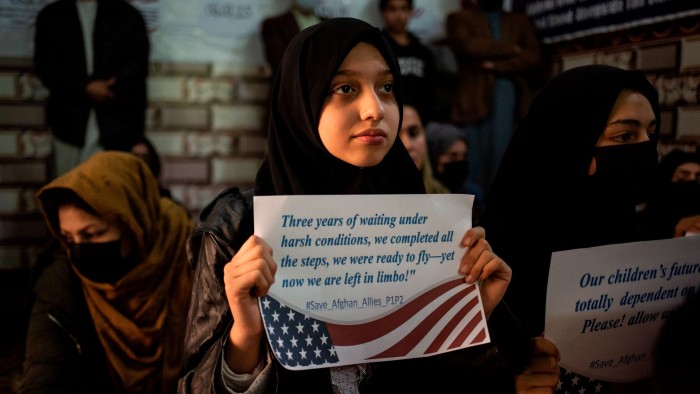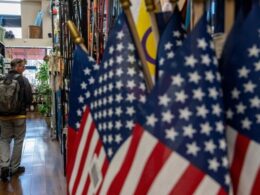Unlock the White House Watch newsletter for free
Your guide to what the 2024 US election means for Washington and the world
Pakistan is on the verge of deporting nearly 900,000 Afghan refugees after the Trump administration scrapped funding assistance to the country and froze resettlement programmes.
The country hosts about 3mn refugees from Afghanistan, who fled over the neighbour’s porous border seeking shelter from decades of war and since the Taliban’s return to power in 2021
Pakistan’s interior ministry this month warned 870,000 holders of Afghan citizenship cards, which Islamabad began issuing in 2017, to leave “voluntarily” before it began forced repatriations on April 1.
“Declining international assistance was a significant point” in the move to increase deportations, according to one senior Pakistani diplomat who asked to remain anonymous to speak candidly.
The US accounted for 42 per cent of the more than $100mn in international aid Pakistan received last year for hosting Afghan refugees, according to the UN High Commissioner for Refugees.
But US President Donald Trump’s state department has frozen nearly all foreign aid, including refugee assistance programmes. It has also paused all refugee resettlement in the US except on an individual, case-by-case basis in an executive order signed on January 20.
Both the adminisrtation’s foreign aid and refugee resettlement freezes have been challenged in court. But western and Pakistani officials said the aid was unlikely to return to previous levels, and even with US funding, international assistance to Pakistan for Afghan refugees last year was far short of a $368mn target set by the UN.
Qaiser Khan Afridi, a UNHCR spokesperson for Pakistan, said the US funding freeze would “hugely impact” the agency’s operations, adding that its “ability to respond in the event of an emergency is also being severely . . . challenged”.
There are also more than 20,000 Afghan refugees and their families who are awaiting resettlement in the US under special immigrant visas for assisting US and Nato forces.
Vice-president JD Vance told CBS News’s “Face the Nation” in January that the vetting process was too weak to allow refugees from Afghanistan to enter the country.
Pakistan’s foreign minister Ishaq Dar told Turkish television channel TRT last month these refugees would also be deported if Washington did not accept them by September.
A spokesperson said the US state department was “continually evaluating all of our programs to ensure strategic alignment with the Administration’s America First policy priorities” and was “in close communication” with Islamabad over “the status of Afghan nationals in US resettlement pathways”.
The spokesperson also said that processing of Afghans special immigrant visas continued, adding that visa-holders “may make their own commercial flight arrangements” to the US.
In late 2023, Pakistan began forcibly deporting Afghan refugees, sparking warnings of a humanitarian crisis. More than 800,000 have returned to Afghanistan since then, according to UNHCR.
These include women who were attending schools in Pakistan — which the Taliban has banned — and those at risk of persecution over their support for Nato forces, UN officials and activists have said.
Pakistan has justified the deportations by pointing to a resurgence of violence in its Afghan border regions since the Taliban takeover in Kabul.
But human rights group Amnesty International has recorded “police night raids, harassment and arbitrary detention of hundreds of Afghan refugees, including women and children” in Islamabad.
Relations between the neighbours have deteriorated in recent months as Islamabad has accused the Taliban — which it supported during the 20-year war — of offering a haven to militant groups such as the Pakistani Taliban and Balochistan Liberation Army.
Suhail Shaheen, a spokesperson for the Taliban government, said that using the refugees “as a pressure tool will not help solve the issues between our countries”.
“It will only widen the gap of mistrust between the two neighbours,” he added.
Analysts warned that Afghanistan, which is suffering a severe economic crisis under pressure from sanctions and the loss of western aid, would struggle to integrate millions of displaced arrivals.
“The Taliban are saying, ‘bring it on.’ They don’t want Pakistan to have leverage over them,” said Graeme Smith a senior consultant with Crisis Group.
But the returnees were “walking into a real humanitarian disaster and an economy that cannot grow fast enough”, he added.
Additional reporting by James Politi in Washington
Source link









